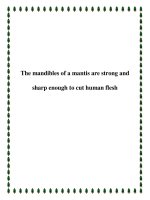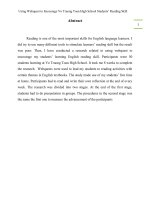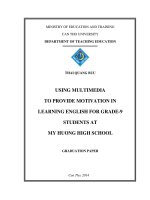Using enough to combine two clauses
Bạn đang xem bản rút gọn của tài liệu. Xem và tải ngay bản đầy đủ của tài liệu tại đây (13.68 KB, 1 trang )
Using enough to combine two clauses
Enough can be used as an adjective or adverb. As an adjective, enough is used to modify a noun.
I have bought enough eggs.
As an adverb, enough is used to modify an adjective or another adverb.
She is old enough to know better.
We can combine two sentences into one using enough + infinitive.
Before combining two clauses using enough, make sure that they are both affirmative or negative.
Compare:
My grandfather is very fit. He can run four miles at a stretch.
Here both sentences are affirmative.
My grandfather is fit enough to run four miles at a stretch.
Note that the adverb enough goes after the adjective or adverb it modifies.
My neighbor is very rich. He can buy whatever he wants.
My neighbor is rich enough to buy whatever he wants.
The room was very spacious. It could easily accommodate 50 people.
The room was spacious enough to easily accommodate 50 people.
We can use enough to join two clauses even if they have different subjects.
Study the examples given below.
The orator spoke very loudly. I could hear him.
The orator spoke loudly enough for me to hear him. (Note the use of the structure for me.)
There is plenty of time. We can play one more game.
There is enough of time for us to play one more game.
The mangoes are ripe. You can eat them.
The mangoes are ripe enough for you to eat.
The oranges are cheap enough. You can buy them.
The oranges are cheap enough for you to buy.
Stay on top of your writing! Download our grammar guide from www.englishgrammar.org to stay up-to-date.
Powered by TCPDF (www.tcpdf.org)









